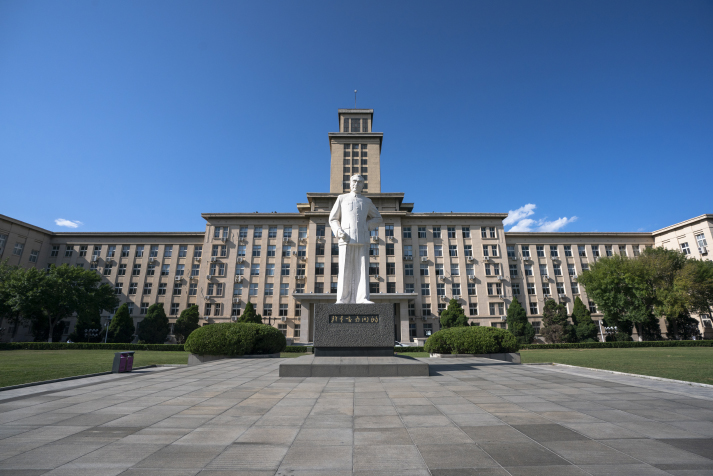
A statue of late Chinese Premier Zhou Enlai in front of the main building at Nankai University in Tianji (WAN QUAN)
Located in the southern part of Tianjin, a municipality neighboring Beijing, Nankai University was founded in August 1919. Over the past 100 years, the university has been a mosaic of China's history.
At the time of its birth, China was struggling under the rule of warlords who were battling for dominance after the fall of the Qing Dynasty (1644-1911), the last imperial dynasty of the country, and was in a fragmented state. Zhang Boling and Yan Xiu, two patriotic educators from Tianjin, had learned about modern educational systems abroad and decided to establish a modern system in their hometown to practice the ideology of Saving the Nation Through Education. They started with Nankai Middle School in 1912.
With the motto of Dedication to Public Interests, Acquisition of All-Around Capability and Aspiration for Daily Progress, Nankai University was established with the aim of fostering students who would know China and serve China.
"Patriotism is the soul of Nankai University," President Xi Jinping commented while visiting the campus in January. "It is the glorious tradition of Nankai."
It was Xi's first stop during an inspection tour of Tianjin, where he saw the history of Nankai University through an exhibition and emphasized that it is a priority to nurture patriotism among students so they can become a new generation of capable young people well-prepared to join the socialist cause.
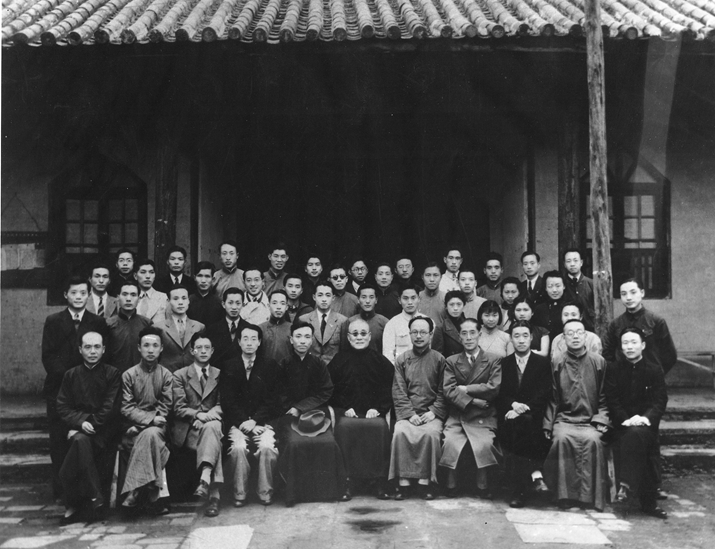
Zhang Boling (center, front row), one of the founders of Nankai University, with students of National Southwestern Associated University in 1939 (COURTESY PHOTO)
Tradition cherished
A statue of late Premier Zhou Enlai graces the front of the main building of Nankai University, which is where the alumnus began his revolutionary trajectory.
Zhou was also a graduate of Nankai Middle School. In 1919, he became one of the first batch of students enrolled in Nankai University. At the time, there were only seven professors and 96 students on campus.
In September 1935, when China was battling Japanese aggression, Zhang raised three questions before students at the opening of the semester: Are you Chinese? Do you love China? Do you want China to be good? The questions, which became known as the Three Patriotic Questions, have been posed to new students every year since.
When Japan launched an all-out war against China in July 1937, Tianjin was one of their first targets and Nankai University a prime target since Zhang had made the school a major platform for fostering patriotism and resisting Japanese aggression. Nankai University was bombed to the ground and occupied by Japanese troops. The campuses of the other two leading higher learning institutions—Peking University and Tsinghua University in Beijing—also fell to the Japanese.
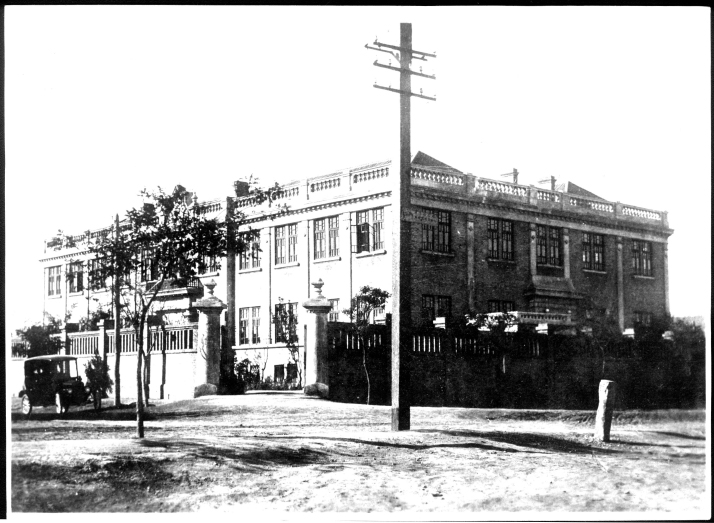
The site of Nankai University in Tianjin in 1919-23 (COURTESY PHOTO)
The three universities retreated to Changsha in central China's Hunan Province and then to Kunming in Yunnan Province in the southwest, where they merged to form National Southwestern Associated University. Despite dire shortages of food, equipment, books and other essentials, they managed to run a modern university and produce many, if not most, of China's most prominent academics, scholars, scientists and intellectuals.
After the Chinese People's War of Resistance Against Japanese Aggression ended in 1945 with Japan's defeat in World War II, the three universities went back to their original locations.
In 1949, within months after the liberation of Tianjin from the Kuomintang's rule, over 320 students from Nankai University volunteered to join the People's Liberation Army led by the Communist Party of China (CPC), accounting for more than 40 percent of the total number of students on campus.
This tradition of serving for the nation has continued to endure. Since the 18th CPC National Congress in 2012, more than 50 students from Nankai University have volunteered for military service.
In September 2017, eight students from Nankai University, who had joined the military, wrote a letter to Xi and received a reply from the president.
"I am gratified by your aspirations and passion after hearing that you have temporarily left campus and have joined military camps, with the ideal of serving the country," Xi wrote in his letter. "There have been many literary men with ideals and integrity who have renounced the pen for the sword in history. A number of Nankai University students rushed to the battlefield to shed blood or sacrifice their lives during the Chinese People's War of Resistance Against Japanese Aggression."
The president said the eight students had set a great example for young Chinese people and told them to cherish the opportunity of serving in the military and commit themselves to the country's goal of building a strong military.
Currently, the eight students have returned to campus to continue their studies, while another 16 from the university have taken up the baton and joined the army this year.
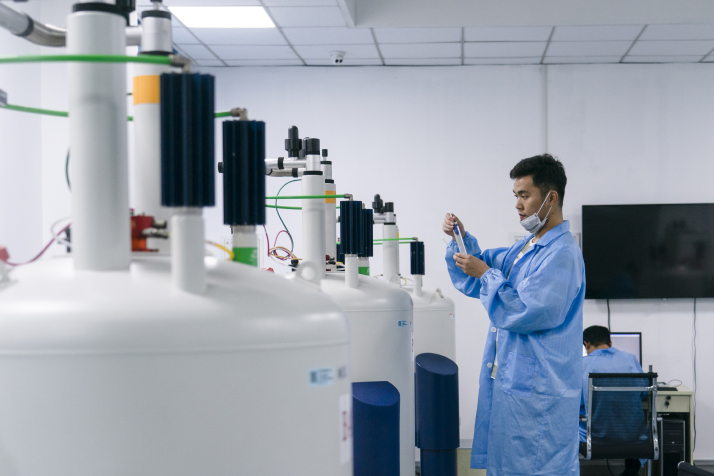
A student works at a lab of the College of Chemistry at Nankai University on August 28 (WAN QUAN)
Learn and work hard
Long known as one of the top universities in China, Nankai ranks in the forefront among its peers in various academic areas, especially mathematics and chemistry. Shiing-Shen Chern, a mathematician known as one of the greatest geometers of the 20th century, is the only Chinese winner of the Wolf Prize in Mathematics, the equivalent of the Nobel Prize. He founded the Nankai Institute of Mathematics in 1984, after he returned from the United States. He has taught at several Chinese and U.S. universities, including Princeton University, the University of Chicago and the University of California, Berkeley.
In 1923, chemist Yang Shixian joined the Nankai faculty, where he worked with his peers to boost the development of the chemistry department. In the 1950s, when the country urgently needed to develop its own green pesticides, Yang decided to switch from drug research, which he had been doing for decades, to this new area and made major breakthroughs.
"Professor Yang told us that chemistry must work for the prosperity of our nation," Li Zhengming, a chemist and a student of Yang, recalled.
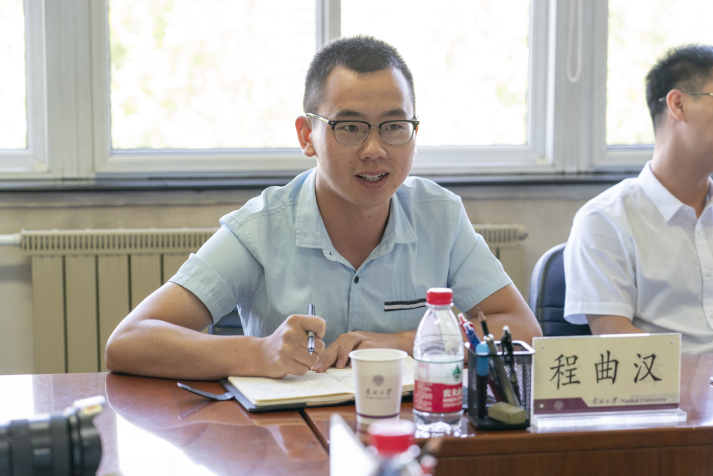
Cheng Quhan, a graduate of Nankai University, shares his story of working in southwest China's Tibet Autonomous Region as a volunteer teacher at a symposium in Tianjin on August 28 (WAN QUAN)
"The Nankai College of Chemistry has always focused on the international academic frontier. In response to the critical development needs of the country, it has continuously opened up new fields and built up new academic institutions," said Chen Jun, a professor at the university.
In May 2018, electronically stored information (ESI) data showed that Nankai University's ESI documents were cited most frequently among Chinese higher learning institutions.
Cheng Quhan, a graduate from the School of Life Sciences at the university, has just returned from a year of volunteering as a teacher in southwest China's Tibet Autonomous Region after receiving his bachelor's degree in 2018.
The volunteer teacher program was initiated by the university in 1999, when more than 200 graduates went to Gansu Province and Xinjiang Uygur Autonomous Region in the northwest and Tibet to teach in primary and middle schools.
As a student from a rural area in southwest China's Sichuan Province, Cheng cherished the opportunity to study in Nankai University and is always ready to serve the most needy areas in the country with the knowledge he has acquired.
Ai Weijun, Vice Dean of the Law School at Nankai University, just returned from Gaofang Village in Gansu, where he served as secretary of the local Party branch. Since the late 1990s, the university has paired with the village to support its poverty alleviation efforts, sending university faculties to work there. Ai had worked in the village for two years, helping to market the villagers' agricultural products.
Ai and Cheng have become role models of patriotism on and off campus, inspiring more young people to participate in programs for public good. "We will share our stories with more people in the future to carry forward Nankai University's tradition of making contributions to the nation," Ai told Beijing Review.
|